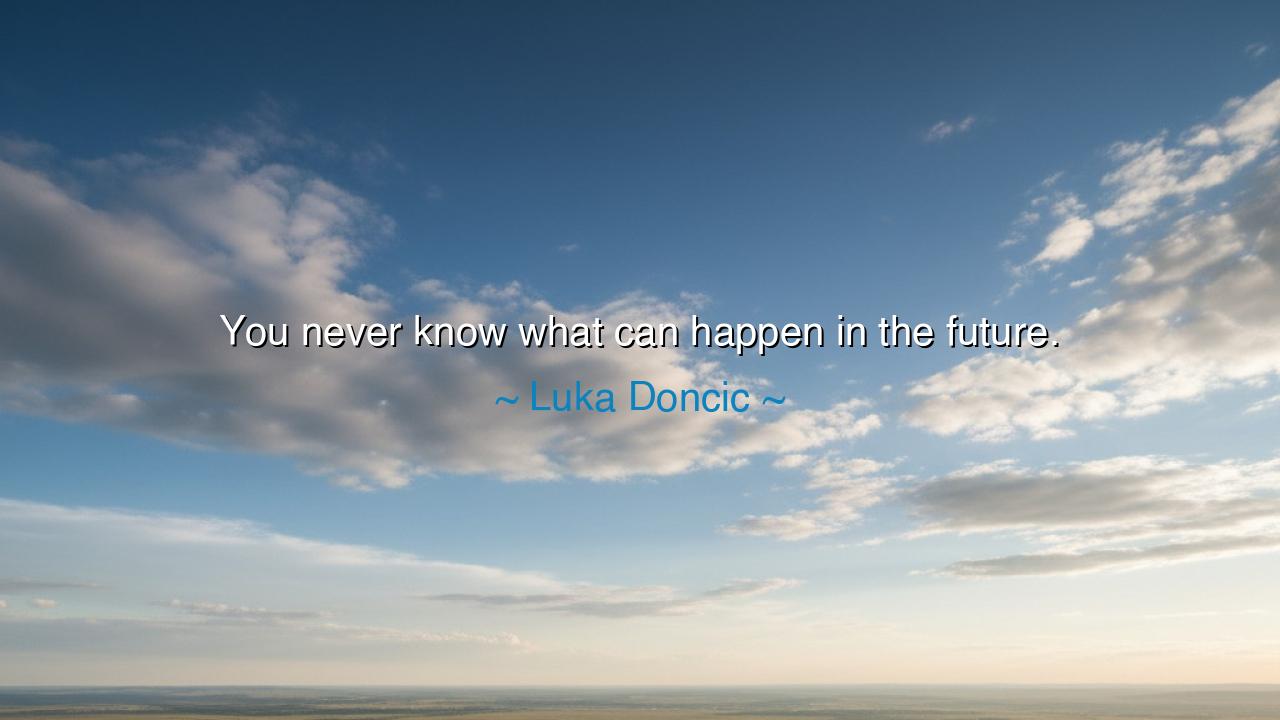
You never know what can happen in the future.






The young prodigy Luka Dončić, whose rise in the world of sport has been nothing short of meteoric, once spoke with simple yet profound humility: “You never know what can happen in the future.” Though spoken in the language of the present age, this statement carries the timeless wisdom of the ancients. For it reminds us of one of life’s greatest truths — that the future is an undiscovered land, shrouded in mystery, where even the most certain paths may twist, and the most impossible dreams may find their way to reality. In these words lies both caution and hope, both reverence for fate and faith in possibility.
To say “You never know what can happen in the future” is to acknowledge the vastness of the unknown — to bow before the infinite forces that govern time and chance. It is a recognition that no human being, no matter how skilled or wise, can fully control the unfolding of destiny. Yet, there is strength in this uncertainty. For if we cannot predict what lies ahead, we can at least live with the wonder that anything might be possible. Luka Dončić, though still young, speaks like a philosopher of the court: reminding us that greatness often arrives unannounced, and that tomorrow may hold what today cannot yet imagine.
The origin of this wisdom arises not from theory, but from experience. Luka himself began his journey far from the global spotlight, a boy from Slovenia with a ball, a dream, and a relentless spirit. Few could have foreseen that he would become one of the brightest stars in the world’s most competitive stage. And yet, through perseverance, talent, and the unseen hand of the future, what once seemed unlikely became inevitable. His quote is not boastful, but humble — the voice of one who has seen life unfold in ways beyond his control and understands that destiny is a tapestry woven by both effort and mystery.
The ancients, too, knew this truth well. The philosopher Heraclitus declared that “change is the only constant,” and the Stoic Marcus Aurelius wrote that the course of events cannot be fully known or tamed, only embraced with courage and calm. Great empires have risen and fallen upon the tides of this uncertainty. Julius Caesar, standing on the banks of the Rubicon, uttered his fateful words — “The die is cast.” He did not know whether his crossing would bring glory or ruin, yet he stepped forward. His act reminds us that to live fully, we must accept that the future is both peril and promise, forever beyond the full grasp of the human mind.
And so, Luka’s words echo across centuries: “You never know what can happen in the future.” They carry within them a call to humility — to recognize that fortune may change at any moment, and that arrogance is the enemy of wisdom. But they also carry a call to hope, for if the future is uncertain, then even the darkest present holds the possibility of light. History is filled with those who rose from despair because they refused to believe that their fate was sealed — from Nelson Mandela, who spent 27 years in prison before leading a nation, to Helen Keller, who turned blindness and silence into a legacy of inspiration. Their lives prove the truth of Luka’s words: that no one, not even time itself, can predict what a determined heart might achieve.
The lesson, then, is this: live not in fear of the unknown, but in awe of it. Do not seek to control the future, for it is not yours to command — instead, prepare your spirit to meet it with strength and openness. Let your actions today be guided by integrity and purpose, and trust that tomorrow will unfold as it must. The seed planted in patience today may blossom in ways you cannot foresee. The door you knock upon now, though closed, may one day open when the time is right.
So, remember the wisdom of Luka Dončić, spoken not as prophecy but as truth drawn from life itself: “You never know what can happen in the future.” The path ahead may twist unexpectedly, yet therein lies the beauty of being alive. For if all were known, there would be no wonder, no growth, no triumph. Embrace the uncertainty — not as chaos, but as the sacred rhythm of existence. Walk forward with courage, act with faith, and remain ever open to the unfolding miracle of the days yet to come. For the future, unpredictable though it may be, belongs to those who meet it with hope.






AAdministratorAdministrator
Welcome, honored guests. Please leave a comment, we will respond soon